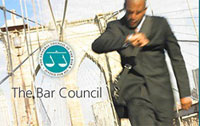Workshops past
Recently, in the evening stream of the Dublin Legal Workshop (School of Law, Trinity College Dublin), on 3 April 2007, Andrea Martin, solicitor and media law specialist gave a talk entitled:
Right of Reply – a Workable Proposition for the Media?
Her argument was that a recent statutory proposal for a right of reply on broadcast media was neither necessary nor desirable, but that a voluntary scheme operated by broadcast media would have a lot to recommend it. …




